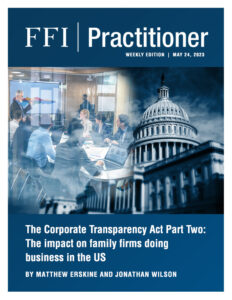
View this edition in our enhanced digital edition format with supporting visual insight and information.
This week’s FFI Practitioner concludes a two-part overview by Matthew Erskine and Jonathan Wilson about the Corporate Reporting Act and its impact on family enterprises. In the second part of their overview, Matthew and Jonathan explore how the reporting requirements may impact family business owners who have placed shares in trusts for their minor children, among other topics.
One of the biggest open secrets for family enterprises in the US in 2023 is the impact of the Corporate Transparency Act (CTA). In the first part of this article, we discussed the technical requirements of the CTA. In this second part, we will discuss the impact that CTA reporting will have both for US businesses and foreign firms doing business in the US.
Reviewing the Basics of the Corporate Transparency Act
The CTA requires existing and future companies, either formed or registered to do business in the US, to electronically file a report with the Financial Crimes Enforcement Network (FinCEN) of the US Treasury Department. These reports will file into an as-yet-nonexistent database of individuals who are direct or indirect beneficial owners of the reporting company, as well as individuals reporting the information for the reporting company. Companies must provide beneficial ownership information (or “BOI”) and keep that information up to date going forward. The intent of the law is to allow governments and agencies access to beneficial ownership of companies to combat money laundering in the US.
Existing reporting companies, as defined by the CTA, must report before January 1, 2025. Companies that are formed or registered to do business in the US after January 1, 2024, must report within 30 days of the date of formation or registration to do business in the US.
Each report must identify each direct or indirect beneficial owner of the reporting company, and newly formed or registered companies also need to identify their company applicant. Each BOI report must include the full legal name, date of birth, residential street address, a unique identifying number,1 and an image file of the document that provides the unique identifying number for both the beneficial owners of the company and the company’s applicant. Once a report is filed, a reporting company must file an amendment within 30 calendar days after any item of previously reported information changes.
Although the Treasury Department has stated that gathering and reporting this information is no greater burden than applying for a library card, these new requirements will impose unique burdens on family-owned businesses.
Identifying Beneficial Owners
The CTA defines a “beneficial owner” of a reporting company to include any individual who directly or indirectly owns 25 percent or more of the ownership interest in the reporting company or exercises substantial control over the reporting company. FinCEN has issued regulations that describe specifically how each of these concepts should apply.
Family Relationships and Substantial Control
FinCEN’s definition of “substantial control” is a facts and circumstances test. A person has substantial control if that person serves as a senior officer; has authority over the appointment or removal of any senior officer or a majority of the board of directors (or similar body); directs, determines, or has substantial influence over important decisions of the reporting company; or has any other form of substantial control over the reporting company.
FinCEN’s regulations define “senior officer” to mean “any individual holding the position or exercising the authority of a president, chief financial officer, general counsel, chief executive officer, chief operating officer, or any other officer, regardless of official title, who performs a similar function.”2 (Emphasis added.) Because the regulations look through the formality of title and cover any person “who performs a similar function,” they have special application to a family-owned business. For example, a family-owned business may need to report a parent as a “senior officer” if the children with officer titles routinely consult with the parent for advice and consent on major decisions, even if the parent has no formal title.
In a similar way, by defining “substantial control” to include any person who “has any other form of substantial control over the reporting company,” the regulations could potentially include family members who have no formal title and no formal duties over the family-owned business but who, based on cultural norms, routinely solicit advice and consent from those family members. It is important to consider whether the extent and uniformity of such solicitations cause these family members to have a form of substantial control. If they do, then they should be listed as beneficial owners in the company’s BOI report.
Inheritance and Children
Owners of family businesses sometimes grant shares to minor children either directly or, more often, through a trust, with the dual purpose of moving the future appreciation of the stock out of the parent’s estate and giving the child a stake in the future of the business as a potential future owner-manager. A minor child3 who would otherwise be a beneficial owner of a reporting company is not included in the company’s BOI report; however, the parent or legal guardian of the minor child must be included in the BOI report.
Advisors to family businesses where a minor child would fall within the definition of beneficial owner should take care to note the child’s birth date. When the child reaches the age of majority, that fact will constitute a change in previously reported information with respect to the reporting company’s BOI report. The reporting company will need to amend its BOI report (removing the child’s parent or guardian and their Personally Identifying Information (PII) and providing the now adult child’s name and PII) within 30 calendar days after the now adult child’s birthday.
Application to Foreign Entities
The CTA also applies to non-US entities that register to do business in the US. This would include a foreign entity that was formed under the laws of another country that opens a branch in the US. What is not clear is how the beneficial ownership reporting requirements will apply when an individual has inheritance rights created by a civil code.
Conclusion
The Corporate Transparency Act will raise challenging and unfamiliar issues to advisors of family businesses. Because FinCEN’s regulations take effect January 1, 2024, advisors should have their family businesses conduct an inventory. Each one should collect its constituent documents and compile a capitalization table that identifies the company’s owners. The company should identify its directors, senior officers, and other persons who have any form of substantial control. If necessary, the company should retain counsel to advise on the process. As part of the process, the company should implement a procedure to track its beneficial owners and their PII in order to file amendments within 30 days after any change in previously reported data. In many situations, the company and its owners may decide to amend the company’s governance documents to make decision-making and BOI reporting easier.
References
1 This may be a non-expired U.S. passport or a non-expired identification document such as a driver’s license issued by a state, local government, or Indian tribe, or a non-expired passport issued by a foreign government if the individual does not possess any of the other document types listed.
2 Financial Crimes Enforcement Network, US Department of the Treasury. (2023, March 24). Beneficial Ownership Information Reporting Frequently Asked Questions. https://www.fincen.gov/sites/default/files/shared/BOI_FAQs_FINAL_508.pdf
3 An individual is a “minor child” with reference to the laws of the state or Indian tribe in which the domestic reporting company is formed (or where the foreign reporting company is first registered). Attorneys should take care to check the child’s age and the relevant laws in the applicable state or Indian tribe, since the applicable age of majority may vary by state. The age of majority in most states is 18, although it can be higher in some states and/or for particular purposes. For example, the state of majority in Florida is 18, but for purposes of the Uniform Transfers to Minors Act, the age may be between 21 and 25, as determined by the transferor. FinCEN’s regulations do not specify which age to apply for those states where the age of majority may vary by purpose. The conservative approach would be to observe the youngest potentially applicable age.
Disclaimer: The views expressed in this article are those of the author only. The information contained in this article is provided solely for informational purposes. This article does not constitute legal advice or create an attorney-client relationship. Because of the generality of this article, the information provided herein may not be applicable in all situations or in all jurisdictions and should not be acted upon without specific legal advice from a licensed attorney based on particular situations.
About the Contributors

Matthew Erskine is the managing partner of Erskine & Erskine LLC, a fourth-generation law firm, and The Erskine Company, LLC, a consulting firm. He focuses on strategic planning and legal services for business owners, professionals, individuals, families, collectors, and inheritors of unique assets, helping his clients and their families solve their problems through customized estate, tax, and management solutions. Matthew can be reached at m.erskine@erskineco.com.

Jonathan Wilson is a co-founder of FinCEN Report Company, LLC, www.fincenreport.com, an online collaboration and filing solution for beneficial ownership reports under the Corporate Transparency Act. He is also a partner in the law firm of Taylor English Duma LLP with 31 years of experience in corporate, M&A, and securities matters. He is the author of The Corporate Transparency Act Compliance Guide (to be published by Lexis Nexis in the summer of 2023) and the Lexis Practical Guidance Practice Note on the Corporate Transparency Act.

View this edition in our enhanced digital edition format with supporting visual insight and information.





